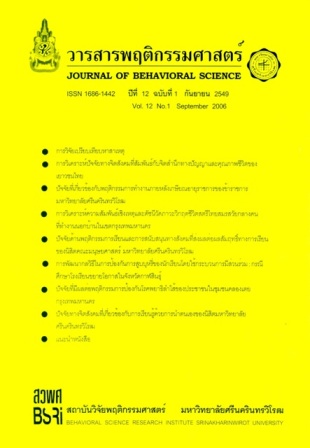ปัจจัยทางจิตสังคมที่เกี่ยวข้องกับการเรียนรู้ด้วยการนําตนเองของนิสิตมหาวิทยาลัย ศรีนครินทรวิโรฒ
Abstract
The purposes of this research were to study the relationships between social psychological factors related to self – directed learning , to discover the predictive factors of self – directed learning and to compare student’s self – directed learning classified by fields of study. The samples in this research consisted of 360 360 class 2 students at Srinakharinwirot University from every faculty during the 2005 academic year. The independent variables were psychological factors, such as intrinsic motivation, perceived self – efficacy, readiness of self-directed learning, attitude toward self – directed learning and social factors, such as family factors and university factors. The instrument was 12 parts of questionnaire. Statistical Methods that used to analyze data were Pearson Product Moment Correlation Coefficient, Stepwise Multiple regression analysis, One-Way ANOVA and Tukey. The research results found that :
1. The psychological factors were intrinsic motivation, perceived self – efficacy, readiness of self-directed learning and attitude toward self–directed learning had positive correlation to student’s self–directed learning with statistical significance at the .01 level.
2. The social factors were family factors that had family relationship, learning modeling, learning support and university factors that had facilitator of learning , peers relationship, readiness of learning resource in Srinakharinwirot University had positive correlation to student’s self–directed learning with statistical significance at the .01 level.
3. The psychological factors, such as readiness of self-directed learning, perceived self – efficacy, and social factors, such as learning modeling and facilitator of learning , all together were the co – predictors of student’s self – directed learning that could be predictable 68.900 of percentage with statistical significance at the .001 level.
4. The students who had studied in different fields of study, had different self – directed learning with statistical significance at the .001 level. The students who had studied in the fields of Science and Technology, had self – directed learning more than student who had studied in the fields of Humanity and Social Science and fields of Health Science with statistical significance at the .05 level.
บทคัดย่อ
การวิจัยครั้งนี้มีความมุ่งหมาย เพื่อศึกษาความสัมพันธ์ระหว่างปัจจัยทางจิตสังคมกับการเรียนรู้ ด้วยการนำตนเอง เพื่อค้นหาปัจจัยที่สำคัญในการทำนายการเรียนรู้ด้วยการนำตนเองและ เพื่อเปรียบเทียบ การเรียนรู้ด้วยการนำตนเองของนิสิตมหาวิทยาลัยศรีนครินทรวิโรฒในแต่ละกลุ่มสาขาวิชา กลุ่มตัวอย่าง ที่ใช้ในการวิจัยครั้งนี้เป็นนิสิตชั้นปีที่ 2 ของมหาวิทยาลัยศรีนครินทรวิโรฒ ปีการศึกษา 2548 จำนวน 360 คน จากทุกคณะ ตัวแปรอิสระที่ศึกษาประกอบด้วย ปัจจัยลักษณะทางจิต ได้แก่ แรงจูงใจภายใน ความ พร้อมในการเรียนรู้ด้วยการนำตนเอง การรับรู้ความสามารถของตน เจตคติต่อการเรียนรู้ด้วยการนำตนเอง และปัจจัยทางสังคม ได้แก่ ปัจจัยด้านครอบครัวและปัจจัยด้านมหาวิทยาลัย เก็บรวบรวม ข้อมูลโดยใช้แบบสอบถามจำนวน 12 ตอน สถิติที่ใช้ในการวิเคราะห์ข้อมูล ได้แก่ สถิติสหสัมพันธ์ ของเพียร์สัน สถิติการวิเคราะห์ถดถอยพหุคูณแบบเพิ่มตัวแปรทีละขั้น สถิติการวิเคราะห์ความแปรปรวน ทางเดียว และเปรียบเทียบรายคู่ด้วยวิธีตูกี่ ผลการวิจัยพบว่า
1. ปัจจัยลักษณะทางจิต ได้แก่ แรงจูงใจภายใน การรับรู้ความสามารถของตน ความพร้อมในการเรียนรู้ด้วยการนำตนเอง และเจตคติต่อการเรียนรู้ด้วยการนำตนเอง มีความสัมพันธ์ทางบวกกับ การเรียนรู้ด้วยการนำตนเองของนิสิตอย่างมีนัยสำคัญทางสถิติที่ระดับ .01
2. ปัจจัยทางสังคม ได้แก่ ปัจจัยด้านครอบครัว ซึ่งประกอบด้วย สัมพันธภาพในครอบครัว การเป็นแบบอย่างด้านการเรียนรู้ การสนับสนุนทางการเรียนรู้ และปัจจัยด้านมหาวิทยาลัย ซึ่งประกอบด้วย บทบาทของอาจารย์ในการเป็นผู้อำนวยความสะดวกในการเรียนรู้ สัมพันธภาพกับเพื่อน และความพร้อม ของแหล่งทรัพยากรการเรียนรู้ มีความสัมพันธ์ทางบวกกับการเรียนรู้ด้วยการนำตนเองของนิสิตอย่างมี นัยสำคัญทางสถิติที่ระดับ .01
3. ปัจจัยลักษณะทางจิต ได้แก่ ความพร้อมในการเรียนรู้ด้วยการนำตนเอง การรับรู้ ความสามารถของตน และปัจจัยทางสังคม ได้แก่ การเป็นแบบอย่างด้านการเรียนรู้ และบทบาทของ อาจารย์ในการเป็นผู้อำนวยความสะดวกในการเรียนรู้ สามารถร่วมกันทำนายการเรียนรู้ด้วยการนำตนเอง ของนิสิตได้ร้อยละ 68.900 อย่างมีนัยสำคัญทางสถิติที่ระดับ .001
4. นิสิตในแต่ละกลุ่มสาขาวิชามีการเรียนรู้ด้วยการนำตนเองแตกต่างกันอย่างมีนัยสำคัญทางสถิติ ที่ระดับ .001 โดยนิสิตในสาขาวิทยาศาสตร์และเทคโนโลยีมีการเรียนรู้ด้วยการนำตนเองสูงกว่า นิสิตในสาขา มนุษยศาสตร์และสังคมศาสตร์และนิสิตในสาขาวิทยาศาสตร์สุขภาพ อย่างมีนัยสำคัญทางสถิติที่ระดับ .05
Downloads
Downloads
How to Cite
Issue
Section
License
Behavioral Science Research Institute, SWU
114 Sukhumvit 23, Bangkok 10110, Thailand.
Tel.02-649-5000 # 17600



